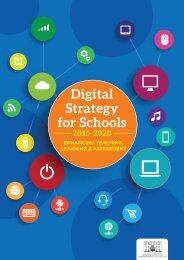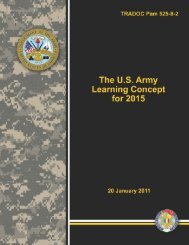Digital Strategy for Schools
TKmc0
TKmc0
Create successful ePaper yourself
Turn your PDF publications into a flip-book with our unique Google optimized e-Paper software.
1. INTRODUCTION<br />
Teachers and school leaders also require considerable support in bringing about meaningful ICT<br />
integration (Lai and Pratt, 2004 in Tondeur, Cooper and Newhouse, 2010). This support enables<br />
schools to successfully foster a culture of innovation and design more authentic learning experiences<br />
<strong>for</strong> students where they are actively engaged with ICT. The <strong>Strategy</strong> will support schools to advance<br />
the process of integrating ICT more deeply into their teaching, learning and assessment strategies<br />
over the next five years.<br />
PURPOSE OF THE STRATEGY<br />
As outlined in earlier sections, a number of education re<strong>for</strong>m initiatives are underway to ensure our<br />
education system can meet the challenges of the 21st century. This re<strong>for</strong>m programme targets<br />
Early Years Education right through to higher education and further education and training. The<br />
<strong>Strategy</strong> will serve to enhance existing re<strong>for</strong>ms and it will in<strong>for</strong>m those that will be implemented over<br />
the coming years. This will be achieved through all future curricula re<strong>for</strong>ms taking account of the key<br />
role ICT can play in helping trans<strong>for</strong>m our education system so that our learners are equipped with<br />
the knowledge and skills required <strong>for</strong> the challenges posed by a rapidly changing world.<br />
ICT in World Education<br />
The availability of abundant in<strong>for</strong>mation, advanced technology, a rapidly changing society, greater<br />
convenience in daily lives and keener international competition are impacting on education systems<br />
and on how we educate our young people and learners of all ages to live and work in this digitally<br />
connected world. To accommodate <strong>for</strong> this much changed world, many countries, such as Australia,<br />
Singapore and New Zealand are trans<strong>for</strong>ming their education systems so that progressive ICT use<br />
is embedded into teaching, learning and assessment activities in schools.<br />
There is also an understanding in the world of business that ICT is changing “job profiles and skills,<br />
while offering possibilities <strong>for</strong> accelerated learning” (The World Bank Group, 2011; p.7) 20 and that all<br />
countries are now facing challenges in order to prepare young people “<strong>for</strong> the world of work and the<br />
jobs available in today’s 21st century society” (Ibid; p.38). These developments are driving the need<br />
<strong>for</strong> a comprehensive <strong>Strategy</strong> around the integration of ICT into our school system.<br />
ICT in National Education<br />
The Irish Government appreciates the need to prepare our young people <strong>for</strong> this evolving world. This<br />
understanding is reflected in the ICT Skills Action Plan 21 , a joint initiative between the Department<br />
of Education and Skills and the Department of Jobs, Enterprise and Innovation.<br />
The National <strong>Digital</strong> <strong>Strategy</strong> (NDS) published by the Department of Communications, Energy and<br />
Natural Resources (DCENR, 2013) is a further step in helping Ireland to reap the full rewards of a<br />
digitally-enabled society. The NDS is one part of the overall Government commitment to creating a<br />
more digitally-empowered society and education system, which involves a suite of complementary<br />
national and regional measures 22 .<br />
There has also been a focus on the role of ICT in the Higher Education (HE) sector with the<br />
establishment of the National Forum on the Enhancement of Teaching and Learning in Higher<br />
Education 23 . The Forum has placed a major emphasis on building digital capacity within the HE<br />
20<br />
World Bank - Learning <strong>for</strong> all, Investing in peoples’ knowledge and skills <strong>for</strong> development (2011) (http://siteresources.worldbank.org/<br />
EDUCATION/Resources/ESSU/Education_<strong>Strategy</strong>_4_12_2011.pdf)<br />
21<br />
ICT Skills Action Plan 2014-2018 (http://www.education.ie/en/Publications/Policy-Reports/ICT-Skills-Action-Plan-2014-2018.pdf)<br />
22<br />
National <strong>Digital</strong> <strong>Strategy</strong> (http://www.dcenr.gov.ie/communications/en-ie/<strong>Digital</strong>-<strong>Strategy</strong>/Pages/home.aspx)<br />
23<br />
National Forum on the Enhancement of Teaching and Learning in Higher Education (http://www.teachingandlearning.ie/)<br />
15




